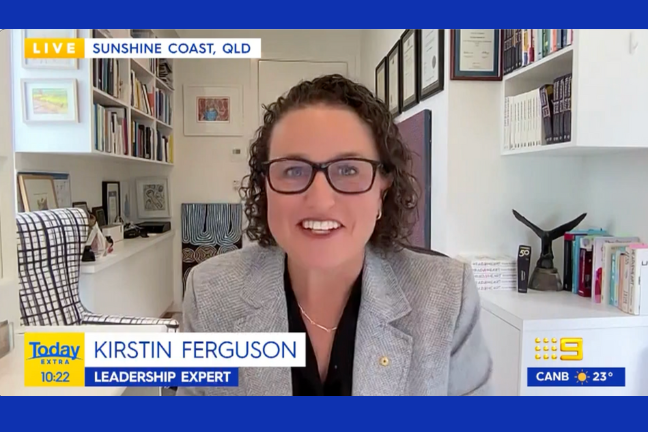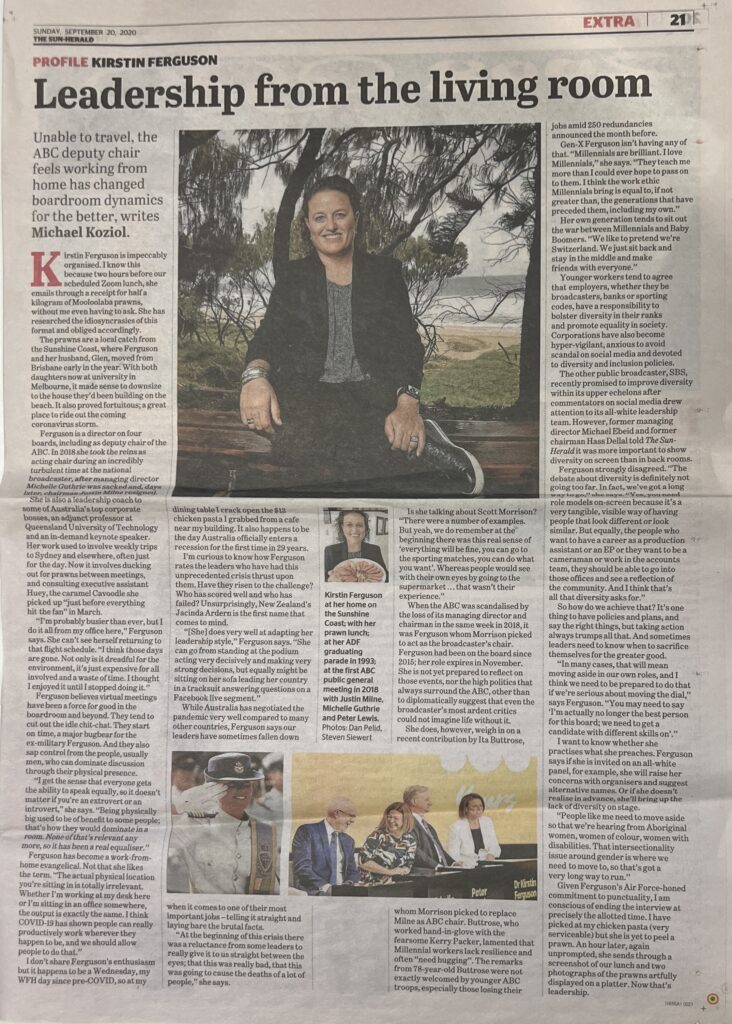
Complete the Head & Heart Leader Scale™ and receive a free, personalised report here.
Complete the Head & Heart Leader Scale™ and receive a free, personalised report here.
Michael Koziol – Sydney Morning Herald & The Age
September 20, 2020
Kirstin Ferguson is impeccably organised. I know this because two hours before our scheduled Zoom lunch, she emails through a receipt for half a kilogram of Mooloolaba prawns, without me even having to ask. She has researched the idiosyncrasies of this format and obliged accordingly.
The prawns are a local catch from the Sunshine Coast, where Ferguson and her husband Glen moved from Brisbane early in the year. With both daughters now at university in Melbourne, it made sense to downsize to the house they’d been building on the beach. It also proved fortuitous; a great place to ride out the coming coronavirus storm.
Ferguson is a director on four boards, including as deputy chair of the ABC. In 2018, she took the reins as acting chair during an incredibly turbulent time at the national broadcaster, after managing director Michelle Guthrie was sacked and, days later, chairman Justin Milne resigned.
She is also a leadership coach to some of Australia’s top corporate bosses, an adjunct professor at Queensland University of Technology and an in-demand keynote speaker. Her work used to involve weekly trips to Sydney and elsewhere, often just for the day. Now it involves ducking out for prawns between meetings, and consulting her executive assistant Huey, the caramel Cavoodle she picked up “just before everything hit the fan” in March.
“I’m probably busier than ever, but I do it all from my office here,” Ferguson says. She can’t see herself ever returning to that flight schedule. “I think those days are gone. Not only is it dreadful for the environment, it’s just expensive for all involved and a waste of time. I thought I enjoyed it until I stopped doing it.”
Ferguson believes virtual meetings have been a force for good in the boardroom and beyond. They tend to cut out the idle chit-chat. They start on time, a major bug bear for the ex-military Ferguson. And they also sap control from the people – usually men – who can dominate discussion through their physical presence.
“I get the sense that everyone gets the ability to speak equally, so it doesn’t matter if you’re an extravert or an introvert,” she says. “Being physically big used to be of benefit to some people, that’s how they would dominate in a room. None of that’s relevant any more, so it has been a real equaliser.”
Ferguson has become a work-from-home evangelical. Not that she likes the term. “The actual physical location you’re sitting in is totally irrelevant. Whether I’m working at my desk here or I’m sitting in an office somewhere, the output is exactly the same. I think COVID-19 has shown people can really productively work wherever they happen to be, and we should allow people to do that.”
I don’t share Ferguson’s enthusiasm but it happens to be a Wednesday, my WFH day since pre-COVID, so at my dining table I crack open the $13 chicken pasta I grabbed from a cafe near my building. It also happens to be the day Australia officially enters a recession for the first time in 29 years. I’m curious to know how Ferguson rates the leaders who have had this unprecedented crisis thrust upon them. Have they risen to the challenge? Who has scored well, and who has failed? Unsurprisingly, New Zealand’s Jacinda Ardern is the first name to mind.
“[She] does very well at adapting her leadership style,” Ferguson says. “She can go from standing at the podium acting very decisively and making very strong decisions, but equally might be sitting on her sofa leading her country in a tracksuit answering questions on a Facebook live segment.”
While Australia has negotiated the pandemic very well compared to many other countries, Ferguson says our leaders have sometimes fallen down when it comes to one of their most important jobs – telling it straight and laying bare the brutal facts.
“At the beginning of this crisis there was a reluctance from some leaders to really give it to us straight between the eyes; that this was really bad, that this was going to cause the deaths of a lot of people,” she says.
Is she talking about Scott Morrison? “There were a number of examples. But yeah, we do remember at the beginning there was this real sense of ‘everything will be fine, you can go to the sporting matches, you can do what you want’. Whereas people would see with their own eyes by going to the supermarket… that wasn’t their experience.”
When the ABC was scandalised by the loss of its managing director and chairman in the same week in 2018, it was Ferguson whom Morrison picked to act as the broadcaster’s chair. Ferguson had been on the board since 2015; her role expires in November. She is not yet prepared to reflect on those events, nor the high politics that always surround the ABC, other than to diplomatically suggest that even the broadcaster’s most ardent critics could not imagine life without it.
She does, however, weigh in on a recent contribution by Ita Buttrose, whom Morrison picked to replace Milne as ABC chair. Buttrose, who worked hand-in-glove with the fearsome Kerry Packer, lamented that Millennial workers lack resilience and often “need hugging”. The remarks from 78-year-old Buttrose were not exactly welcomed by younger ABC troops, especially those losing their jobs amid 250 redundancies announced the month prior.
Gen-X Ferguson isn’t having any of that. “Millennials are brilliant. I love Millennials,” she says. “They teach me more than I could ever hope to pass on to them. I think the work ethic Millennials bring is equal to, if not greater than, the generations that have preceded them – including my own.”
Her own generation tends to sit out the war between Millennials and Baby Boomers. “We like to pretend we’re Switzerland. We just sit back and stay in the middle and make friends with everyone.”
Younger workers tend to agree that employers — whether they be broadcasters, banks or sporting codes — have a responsibility to bolster diversity in their ranks and promote equality in society. Corporations have also become hyper-vigilant, anxious to avoid scandal on social media and devoted to diversity and inclusion policies.
The other public broadcaster, SBS, recently promised to improve diversity within its upper echelons after commentators on social media drew attention to its all-white leadership team. However, former managing director Michael Ebeid and former chairman Hass Dellal told The Sun-Herald it was more important to show diversity on the screen than in the back rooms.
Ferguson strongly disagreed. “The debate about diversity is definitely not going too far. In fact, we’ve got a long way to go,” she says. “Yes, you need role models on-screen because it’s a very tangible, visible way of having people that look different or look similar. But equally – the people who want to have a career as a production assistant or an EP or they want to be a cameraman or work in the accounts team, they should be able to go into those offices and see a reflection of the community. And I think that’s all that diversity asks for.”
So how do we achieve that? It’s one thing to have policies and plans, and say the right things, but taking action always trumps all that. And sometimes leaders need to know when to sacrifice themselves for the greater good.
“In many cases that will mean moving aside in our own roles, and I think we need to be prepared to do that if we’re serious about moving the dial,” says Ferguson. “You may need to say ‘I’m actually no longer the best person for this board, we need to get a candidate with different skills on’.”
I want to know whether she practises what she preaches. Ferguson says if she is invited on an all-white panel, for example, she will raise her concerns with organisers and suggest alternative names. Or if she doesn’t realise in advance, she’ll bring up the lack of diversity on stage.
“People like me need to move aside so that we’re hearing from Aboriginal women, women of colour, women with disabilities. That intersectionality issue around gender is where we need to move to, so that’s got a very long way to run.”
Given Ferguson’s Air Force-honed commitment to punctuality, I am conscious of ending the interview at precisely the allotted time. I have picked at my chicken pasta (very serviceable, for those playing at home) but she is yet to peel a single prawn. An hour later, and again unprompted, she sends through a screenshot of our lunch and two photographs of the prawns artfully displayed on a platter. Now that’s leadership.





